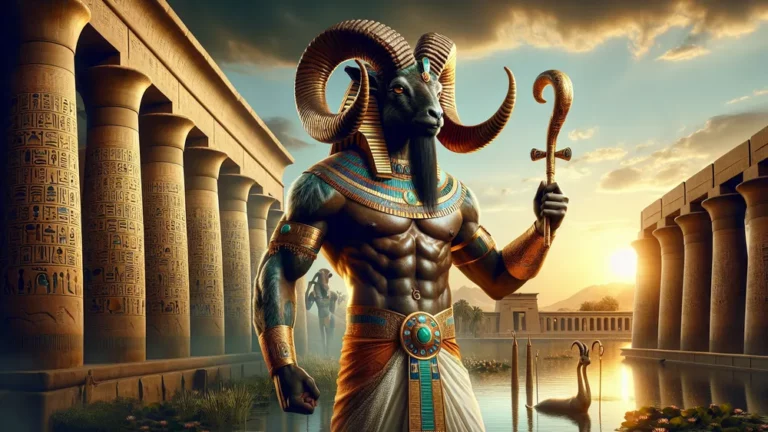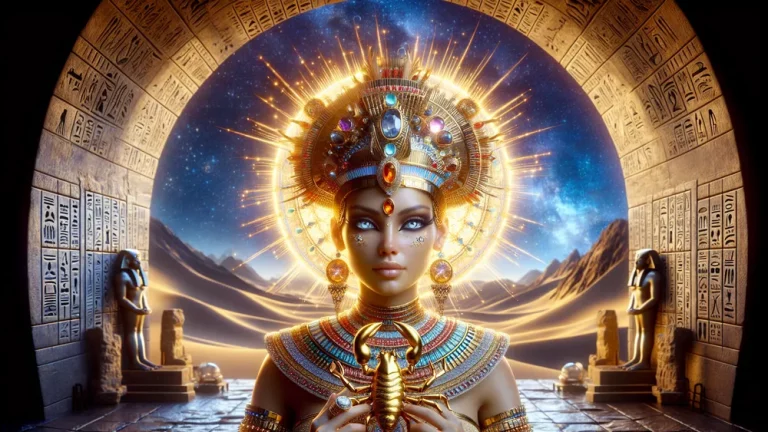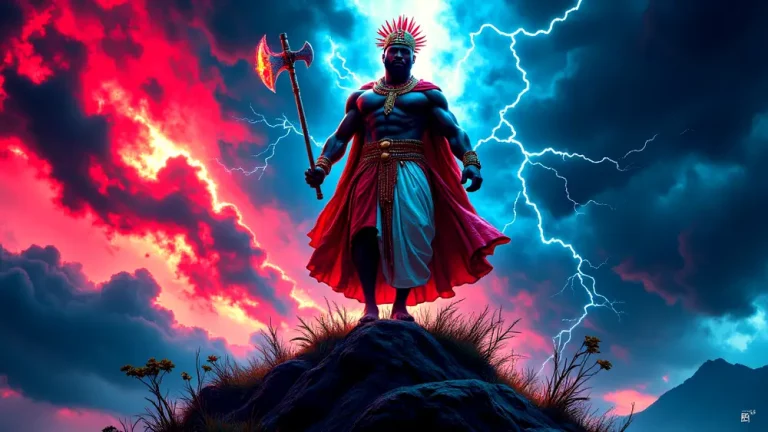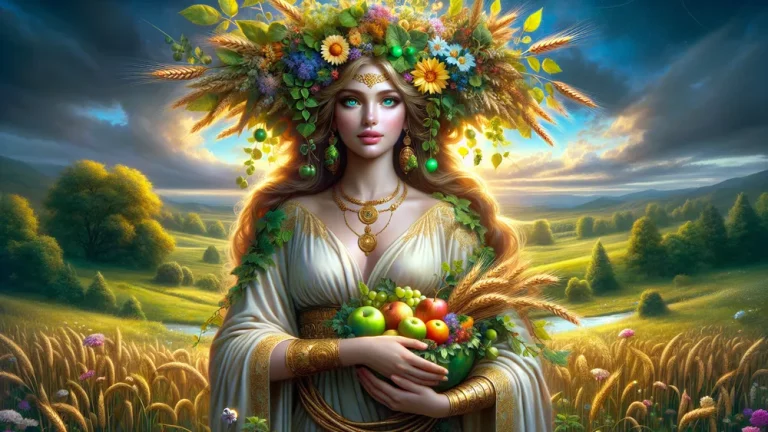Eleos: Greek Goddess Of Mercy And Compassion In Mythology
In the rich mix of Greek stories, Eleos stands as an example of kindness and caring that many people feel close to. Think of someone who, much like a person today who helps others, gives understanding and a helping hand to folks who are needing it. This is what Eleos means, a goddess who gave comfort and hope to ancient Greeks.
Key Points:
- Eleos is the spirit of kindness and understanding in Greek stories.
- She is known for her olive branch, a symbol of peace and caring.
- The Greeks saw her as important for empathy and helping people.
- Worship included rituals at shrines and doing good deeds.
- Her ideas of mercy spread to Roman and Egyptian cultures.
- Eleos worked with Olympian gods, reminding them of compassion.
- She was part of a group of spirits, each with unique roles.
When you learn more about Eleos, you will discover where she came from, what she did in the group of gods, and how she mattered to Greek people and even farther away.
Whether you are new to these stories or looking to know more, this journey means you see how Eleos, with her gentle way and symbolic olive branch, turned into a symbol for being kind in a world that often appeared filled with fights and arguments.
Eleos: Overview and Key Facts
| Key Aspect | Details |
|---|---|
| Name | Eleos |
| Domain | Being kind and Caring |
| Origin | Greek Stories |
| Symbols | Olive Branch, which means peace and kindness |
| Traits | Gentle way, a caring nature |
| Role in Stories | Meant mercy, giving comfort and hope to people |
| Worship Ways | Rituals and gifts, in temples and special places for her |
| Cultural Impact | Changed social rules and values on kindness in old Greek society |
| God Relationships | Met Olympian gods, while known as something different in the group |
| Influence on Cultures | Idea of Eleos reached Roman and Egyptian stories, where kindness was important |
Who is Eleos?
To really get to know Eleos and her place in Greek mythology, people need to explore her beginnings and the role she had in old times. Among many stories, find out where Eleos is from and how she was thought of by the Greeks.
Where Eleos Comes From in Greek Mythology
In Greek stories, Eleos appears as someone important, showing mercy and kindness. She started as a spirit, not a main god like the Olympians, but had an essential role in old Greek society. Unlike many others, Eleos was like today’s help groups, supporting and calming people in a world full of fights and problems.

The Greeks thought of her as gentle, and she gave comfort and understanding. Her presence meant being kind was crucial, and people respected her ability to make others care and build a sense of working together among them, showing how valuable she was in their myths.
In Greek tales, Eleos, though not a major god, was vital in society for her kindness and ability to bring people together like modern support groups.
Eleos in Old Greek Writings
In ancient Greek literature, you can see Eleos talked about now and then, showing her quiet but lasting presence in the ideas of the time. Her role, as what mercy and kindness mean, is part of many stories, just like an idea that happens a lot. In some parts of Hesiod’s works, Eleos is noted as part of how people should act, and this puts the spotlight on kindness.
Even if Homer doesn’t say Eleos’ name in his big works, the ideas of mercy and compassion are present when characters meet and talk, showing that she still matters in these texts.
To help explain how she is included in old writings, here is a list featuring important works and writers hinting at or mentioning Eleos:
- Hesiod: Famous for writing “Theogony” and “Works and Days,” Hesiod wrote about right and wrong in life, and Eleos‘s role can be seen there.
- Aeschylus: A writer of plays, Aeschylus had ideas of mercy and kindness in his serious dramas, showing what society thought about Eleos.
- Sophocles: Another playwright with dramas like “Oedipus Rex” dealing with deep human feelings, along with the ability for mercy, which fits with Eleos‘s traits.
These works and writers talk about the small but real part Eleos had to make Greek literature about doing the right thing and being kind, showing she mattered as a symbol of mercy.
What Eleos Stands For and Her Traits
Eleos, and she represents being full of mercy and kindness, is known by her qualities that match deeply with these good traits. Think of her calming influence like a stable presence in a world full of trouble, bringing understanding and peace.
One strong symbol tied to Eleos is the olive branch, a common sign of peace and kindness which people might recognize from different times and places. This icon means her role as someone who helps fix problems much like how a peacekeeper acts to solve issues and bring people together.
Her presence in old Greek stories was to remind people about why empathy is strong and why being kind was important back then. Through her symbols and qualities, Eleos means lasting ideas about mercy and kindness, giving a message that lasts which still matters today.
How Eleos Fit into Greek Life
After we talked about where Eleos came from and her traits, it’s important to see how these traits were included in the daily lives and how old Greeks did religious things. Let’s look at how people respected Eleos and her effect on Greek culture and how people lived.
Eleos in Ancient Greek Worship
In old Greek religious ways, Eleos was honored with ceremonies that pointed to her role as the spirit of mercy and compassion. Picture these ceremonies like community service events now, where people gather to support and help others who need it.
Those who worshipped Eleos would meet at altars or special spots for her, giving prayers and calling her presence to inspire kindness and sympathy. They didn’t only want divine favor; they wanted to make strong the societal values of mercy and kindness that Eleos stood for. Offerings to her often had olive branches, meaning peace, just like today we might give gifts to show thanks.
The worship of Eleos had particular ceremonies focusing on her gentle and caring nature. People might do charity work, such as giving food or a place to stay to those with less, and that meant Eleos’s power in encouraging goodness in the group. They extended her divine qualities to urge people to have a spirit of mercy every day.
When they took part in these ceremonies, old Greeks not only respected Eleos but committed to the values she meant, building a culture where kindness was essential both spiritually and socially. Throughout these practices, Eleos’s presence was part of life, reminding everyone of the strength of being kind and understanding.
Eleos and the Idea of Mercy in Greek Life
Mercy, as Eleos represented it, was important in forming Greek culture and societal norms, just like how the ideas of kindness and sympathy have effects on groups today. Across various ways, in old Greece, mercy was not just an idea; it was a critical trait that spread through many parts of daily life.
It guided personal relationships, and it helped people act kindly and with understanding to each other. To see the importance of mercy, think of how people now value giving and helping, making people feel close and supportive.
Eleos’s power was seen in the rules and social systems then, where mercy was seen in legal choices, and it meant fairness and forgiveness.
Look at the effects of Eleos on Greek society, seen in these important ways shaped by mercy:
- Judicial Leniency: To promote fairness and good feelings in law cases.
- Charitable Acts: To help caring and aiding those with less.
- Community Cohesion: Helping unity and showing respect among people.
- Moral Education: Teaching the need for empathy and good acts from early times.
- Conflict Resolution: To push peaceful and understanding ways to solve arguments.
These show how Eleos was part of Greek life, affecting both actions of people and wider social rules. Through making mercy a big part of their culture, old Greeks built a community that saw compassion as a main part of who they were, meaning Eleos’s lasting impact in their world.
Spots Where Eleos was Honored
Eleos worship in old times was centered around certain temples and shrines that acted as central places for her honoring, much like today’s churches or community centers are gathering places for group events. A famous spot was the Eleos shrine in Athens that was by the Agora, which was the busy part of the city where people came together for selling and city activities.
This shrine was more than a place for someone to think alone but was also a public space where they could come to look for Eleos’s help and mercy. Having this shrine in an important public area highlights the place of mercy and compassion in Greek culture, and that meant these values were part of daily life.
These sacred places were decorated with signs of peace, like olive branches, and they were often where rituals and offerings happened, which reinforced Eleos’s role as a divine embodiment of mercy. Through these temples and shrines, old Greeks were able to reach out to Eleos, and look for her power to drive acts of kindness and sympathy inside their groups.

In ancient times, Eleos was honored at shrines and temples, especially in Athens near the Agora, symbolizing how mercy and compassion were key parts of Greek culture and everyday life.
Eleos and Other Greek Spirits
Now that we looked at how people worshipped Eleos and her impact on society, we should now check out her connections and ways she related with other divine beings in Greek mythology. We must look into how Eleos fits in with the broader group of Greek spirits and gods. Time to look at it.
Eleos and the Big Gods of Olympus
Among the stories of Greek mythology, Eleos had a special place with the Olympian gods, as a sort of go-between or advisor in a strong group. She was not one of the twelve big gods living on Mount Olympus, but she was still important because she stood for mercy and compassion, which even the mighty gods respected and needed.
Think of her like a calming presence that helped the often wild moods of gods like Zeus or Ares, and it reminded them about empathy and understanding. Her power was quiet but deep, as they often called on her when divine acts needed a softer side.
Where mercy appeared in myths needing gods’ forgiveness, Eleos’s spirit was used to guide what gods did. And this role meant she was needed to keep the balance in their group, showing that the divine world had the same values of compassion she brought out among people.
Eleos and the Other Spirits
Eleos in the big story of Greek mythology was one of the spirits, who each represented different parts of how people feel and act. Think of these spirits as the roles in a community helping with balance. Eleos, who stood for mercy and compassion, was different from others.
For example, Nike stood for winning and was meant to inspire success in fights and games, while Eris meant trouble and chaos, bringing on fights and disorder. These spirits weren’t gods, but they were still key to the myths, providing a deeper look into how people saw life through their characteristics.
To help you see the roles and what Eleos and others were about, here is a table of some of these spirits:
| Daemon | Role/Attribute | Description |
|---|---|---|
| Eleos | Mercy and Compassion | Means kindness and leniency, inspiring empathy |
| Nike | Victory | Stands for winning and success |
| Eris | Conflict and Chaos | Brings conflict and disorder in stories of gods and people |
| Eirene | Peace | Means calm and harmony |
| Thanatos | Death | Represents the calm side of dying |
This table means to highlight how each spirit had a unique role in Greek myths, helping to form the complicated mix of forces shaping the Greek view of the world. By seeing these spirits, you learn how the Greeks saw life parts, from chasing success to facing death, and how Eleos’s role as the spirit of mercy brought balance to the tough sides of life.

How Eleos Touched Other Cultures
Eleos, an idea of mercy and compassion, went beyond Greek myths and found a place in other cultures, like how a strong thought spreads in different places. In Roman tales, mercy was shown as Clementia who had the same traits as Eleos, a way the Romans appreciated being kind and forgiving in rules and personal actions.

This points out how mercy was always valued, affecting social rules and laws. Meanwhile, in old Egyptian culture, Ma’at stood for truth and fairness, and that included mercy. Her job in keeping things balanced echoed what Eleos did, and this pointed out the importance of compassion in human ways.
These links between cultures mean that ideas like those of Eleos weren’t only in Greece but were key to the morals and laws of many old peoples, affecting how they saw fairness and how people dealt with each other.
Pantheon of All the Greek Mythology Spirits and Daimones
Within Greek stories, the group isn’t just the famous big gods of Olympus; it also has a large collection of spirits and daimones that each stand for different parts of life and human feelings, like a team that is different and each plays a crucial role. Spirits like Eleos, Nike, and Eris are important in the myth stories of ancient Greece, and they give extra detail to beliefs.
They often appear in rituals and art as images of virtues, flaws, and nature events. For more understanding of these interesting beings, check out this Greek Spirits and Daimones list, and it provides a full look at their parts and what they mean in Greek mythology. This big list means the traditions are detailed and rich, and it offers insight into how the old Greeks understood everything around them.
FAQs
1. What is the significance of Eleos in Greek mythology?
The significance of Eleos in Greek mythology lies in her embodiment of mercy and compassion, serving as a divine representation of these virtues in ancient Greek culture.
2. How was Eleos worshipped in ancient Greece?
Eleos was worshipped in ancient Greece through rituals and offerings that emphasized mercy and compassion, often conducted at her dedicated shrines and altars.
3. What are the symbols associated with Eleos?
The symbols associated with Eleos include the olive branch, which represents peace and mercy.
4. How does Eleos compare to other Greek deities?
Eleos compares to other Greek deities by embodying the unique virtues of mercy and compassion, which are less emphasized in the more dominant Olympian gods.







